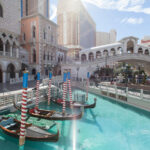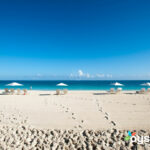The far-flung island nation of Mauritius is a vacationer’s paradise. Located in the Indian Ocean to the east of Madagascar, Mauritius is more accessible than geography might suggest, thanks to direct flights from cities in Australia, Europe, Asia, and Africa. Those who make the trip will be rewarded with a wealth of attractions: coral reefs, colonial relics, rainforests, waterfalls, and of course, beaches. Speaking of the latter, there are plenty of sandy stretches to choose from, despite the country’s relatively small size. For that reason, we’ve created a handy guide to some of the best beaches in Mauritius, with activities catering to all types of travelers.
1. Trou-aux-Biches
This idyllic white-sand beach lies on the northwestern coast along a flat, shallow stretch of turquoise ocean that’s perfect for swimming and snorkeling. Trou-aux-Biches is lined with lush casuarina trees, providing shade and respite from the hot Mauritian sun. There are numerous offshore scuba diving sites nearby. One of the closest — Stella Maru — is a former Japanese fishing trawler that was intentionally sunk in the 1980s to create a reef. Here, you’ll find octopuses, moray eels, and a variety of colorful fish species. Those who aren’t scuba-certified can explore the depths inside a mini-submarine or underwater scooter with Blue Safari Submarine. Beyond the surf and sand, Trou-aux-Biches is home to the Mauritius Aquarium and is within walking distance of Maheswarnath Mandir, the largest Hindu temple on the island. For easy beach access, consider staying at the waterfront Le Sakoa Hotel or the eco-friendly Troux aux Biches Beachcomber Golf Resort & Spa (the latter offers diving classes and excursions).
2. Le Morne
This sheltered lagoon and stunning peninsula remain spared from large-scale development. Windsurfers and beachcombers come here to enjoy the stretch of white sand and windy conditions offshore. Le Morne is more removed from nightlife than most popular beaches, making this corner of Mauritius ideal for families or couples seeking a laid-back getaway. A handful of hotels, such as Paradis Beachcomber Golf Resort & Spa, and The St. Regis Mauritius Resort, provide excellent beach access, while those staying elsewhere will be glad to know that Le Morne’s public peach is one of the island’s finest. The towering Le Morne Brabant mountain can be seen from virtually anywhere on the peninsula. Though the view of the towering peak from the beach is enjoyable, a public trail to the top is well worth the climb for views over the lagoon. It’s highly recommended to go with a guide, though, as some rock climbing equipment is necessary.
Many visitors will be surprised to learn that beautiful Le Morne has a particularly dark past. During the 18th and 19th centuries, runaway slaves took refuge in the mountain’s craggy cliffs and dense vegetation, eventually creating settlements at the summit and in caves. Today, the mountain and peninsula are designated as a UNESCO World Heritage site to remember the slaves’ resistance and fight for freedom, which has been kept alive through Mauritian oral tradition.
3. Trou d’Argent
This isolated beach is located on the island of Rodrigues, an autonomous territory within the Republic of Mauritius and situated roughly 350 miles northeast of the mainland. Rodrigues’ empty beaches and rocky landscape stand in stark contrast to the bustling resort towns and lush forests on Mauritius. Trou d’Argent is arguably the most beautiful beach on the island, as well as one of the most pristine. There are no roads leading to the beach, and thus, no development either. It can only be reached by boat or a 30- to 60-minute walk depending on the departure point. The secluded pocket of sand is enclosed by two craggy cliffs, forming a little bay of crystal clear water. Like all the beaches on Rodrigues, Trou d’Argent is public, though you might spot more wildlife and wandering livestock than people on your hike there. Air Mauritius offers daily service between Mauritius and Rodrigues, so consider extending your stay and exploring this gorgeous, little-known getaway.
4. Flic en Flac
Situated on the western coast of Mauritius, Flic en Flac has come a long way from its origin as a fishing village, yet it still retains a relaxed atmosphere despite the increase in apartments, shops, and hotels. Flic en Flac boasts one of the longest stretches of white sand, totaling eight kilometers, with casuarina trees and the nearby Tamarin Mountain providing a scenic backdrop. The Wolmar section to the south grants the most pristine sections of beach, with family-friendly accommodations at the Hilton Mauritius Resort & Spa. The water here is particularly calm and well-suited for swimming, especially near the lagoon. Unlike many other beaches, Flic en Flac is popular with Mauritians as well. The coastal road is home to plenty of local snack vendors and restaurants serving Creole cuisine. To sample the best local fare, check out Canne à Sucre, but be sure to order a day ahead.
5. Blue Bay
Situated on the southeastern shore, Blue Bay is a quick and easy trip from the airport. Much of this section of Mauritius lacks extensive beaches, with the exception of Blue Bay. A major draw here is Blue Bay Marine Park — one of the most accessible coral reefs on the island. Reasonably priced snorkeling excursions and glass-bottom boat trips depart from the public beach, allowing anyone to witness the underwater scenery regardless of their swimming skills. Longer boat trips to outlying islets can be done via kayak or catamaran. One such island — Ile Aux Aigrettes — encompasses a protected area that is home to the last dry coastal forest in Mauritius, as well as several endangered species. Unfortunately, many species were lost, including the dodo and giant tortoise. A non-indigenous species of tortoise now roams the island alongside native geckos and several flamboyantly-colored bird species. The compact village of Blue Bay makes it easy to walk to restaurants and shops, especially from the beachside Le Peninsula Bay Beach Resort.
6. Grand Baie
Located on the northwestern shores of Mauritius, Grand Baie’s sheltered bay is a must-visit for water sports enthusiasts. Local outfitters offer parasailing, windsurfing, and waterskiing equipment. Mauritius boasts excellent deep-sea fishing opportunities as well. Chartered trips leave from Grand Baie and offer the chance to catch marlin, yellow fin tuna, and much more. Though the beach on the main bay has too much boat traffic for swimming, the adjoining beaches at La Cuvette, Mont Choisy, and Péreybère include some of the best swimming spots on the island. The current is minimal in the sheltered cove, creating clear turquoise water that’s perfect for a leisurely swim. Back on land, the village of Grand Baie is home to plenty of cafes and nightlife options. For a central location between the beaches and town’s amenities, we recommend staying at the all-inclusive Mauricia Beachcomber Resort & Spa.
You’ll Also Like:
All products are independently selected by our writers and editors. If you buy something through our links, Oyster may earn an affiliate commission.









